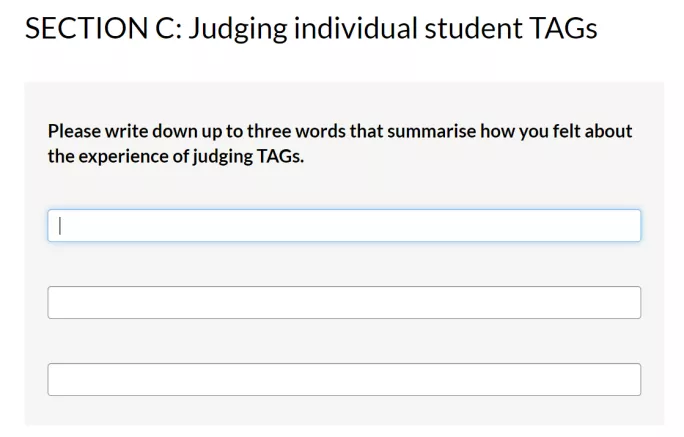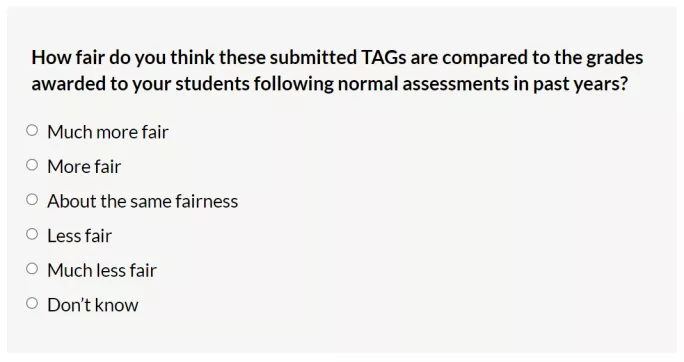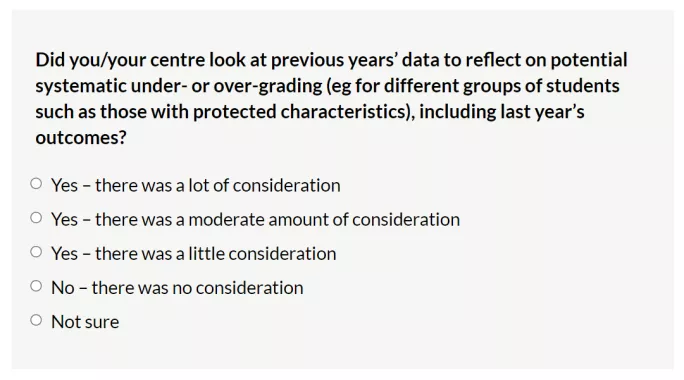Teachers who were involved in assessing and grading GCSE and A-level pupils this year have been asked to “feed back” on the process in a survey launched by Ofqual today.
One question asks teachers to “summarise how you felt about the experience of judging TAGs (teacher-assessed grades)” in three words.
GCSEs 2021: Should schools be running full mock exams?
Background: Teacher-assessed grades get the green light
2021 grades: Teachers relieved of appeals burden
The survey also asks whether teachers think the teacher-assessed grades are fair in comparison to grades awarded through exams in previous years.
The survey asks whether any steps were taken by respondents’ schools to protect against “unconscious biases”, and whether teachers and their schools looked at data from previous years to prevent “systematic under- or over-grading” of different groups of students.
In the survey, the regulator asks teachers if they were aware of Ofqual and exam-board guidance on making objective judgements of students, and asks how useful this was.
And it asks whether staff were able draw on the expertise of special educational needs and disability (SEND) experts and special educational needs coordinators (Sencos) - as well as staff training on bias or academic research - when they were discussing how to avoid bias and if “more information/resources have been useful when considering the issue of making objective judgements”.
In addition, it asks teachers how many individual students in total they assessed grades for, and what percentage of the course they felt they were able to teach, as well as how much of the evidence that they used for grades came from the period after January’s announcement that exams would be cancelled.
The survey closes on 7 August. Students are also being polled regarding their views of the process.
An Ofqual spokesperson said: “Our approach to teacher-assessed grades was informed by a consultation that received more than 100,000 responses, and we are keen to hear from teachers about their experiences this year.
“We carried out a similar piece of work in 2020, surveying and speaking to teachers about their judgements for centre-assessment grades. We published the findings in April on gov.uk, and used the findings to help inform our work on this summer’s arrangements for teacher-assessed grades.”
The survey further asks:
- Whether the evidence collected for TAGs helped to support further learning.
- To what extent factors such as perceived pressure from parents or students; their school’s TAG policy document; giving students the best opportunity to “show what they could do”; and providing a “robust evidence base” in case of appeals influenced teachers’ decisions about the amount of evidence to gather.
- Whether teachers could use the same evidence for all their students.
- How weighty different forms of evidence were for teachers - using a weighting of 0 to 100 - with listed evidence forms, including exam-board set tasks, mock exams, homework, class work, class tests, assignments and coursework.
- How many individual pieces of evidence were typically used for each student.
- How difficult it was to grade students on average, as well as how difficult it was to grade students such as private candidates or those with poor attendance.
- How reasonable adjustments were applied to TAGs.
- What percentage of students teachers felt unsure about giving a grade to.
- Whether they felt undue pressure around their judgements and whether they were aware of steps taken by their school to protect them from student or parental pressure, as well as if they felt confident that their TAG grades, prior to any internal moderation, were “as free as possible from bias”.
- How easy or difficult it was to agree on TAGs with other teachers.
- Whether TAG grades were changed during internal moderation.
- How confident teachers felt in the accuracy of the final submitted grades.
- How confident teachers were “that the final submitted TAGs across all qualifications you signed off were as free as possible from bias”.
- An estimate of how many working days were dedicated to TAGs.
- How prepared students will be for their next stage of study or work.




